Have you ever read through the ingredients printed on a carton of plant milk and understood most of the words, but not the meaning?
We’ve got your back. Here’s a comprehensive list of additives that may be lurking in your plant milk–plus information on what they’re used for, where they come from, and whether or not they’re safe to consume.
Milk Pick’s Stance on Additives in Plant-Based Milk
Hi, Dominique here (founder of Milk Pick).
Before we dive into our list, I wanted to give you a brief overview of our brand's stance on additives in plant-based milk.
In general, we recommend sticking to milk made with real, whole ingredients. Meaning ingredients that aren’t genetically modified or made in a lab. If it’s not a naturally occurring substance, we like to minimize or avoid it as much as possible.
At the same time, we recognize that milk made without these additives costs significantly more money.
Our suggestion is to find a balance.
For instance, I love brands like Marin Living Foods, Three Trees, and Malk. However, I supplement those with brands like Mooala or Wegman’s store-brand almond milk, both of which contain gellan gum.
However, there are certain ingredients I try to completely avoid—natural flavors, carrageenan, and canola oil.
Everyone’s bodies and situations are different.
There are people who drink plant-based milk that’s loaded with additives every day without issue. There are people who drink brands with 100% “clean” ingredients but have a laundry list of health problems.
Nobody knows your body better than you.
But I have two suggestions:
Our goal at Milk Pick is to offer our suggestions and equip you with information to make an informed decision about the type of milk you drink.
Enjoy the article below!
1. Natural Flavors
Natural flavors are one of the most common food and beverage additives these days.
You have probably seen something like “natural flavors,” “natural vanilla flavors,” or a similar iteration listed in the ingredients of some of your favorite plant milk brands.
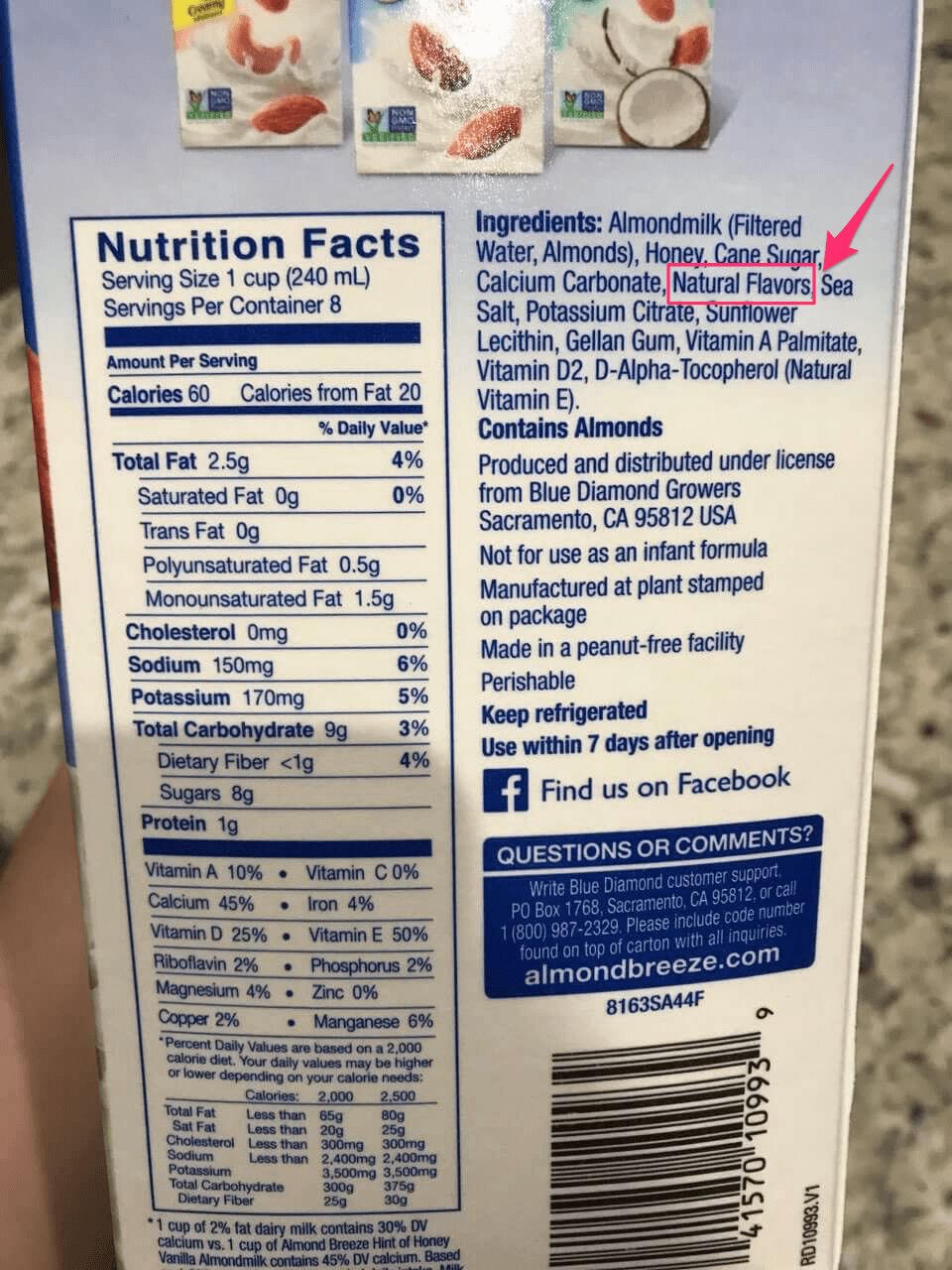
Here’s what that means.
The purpose of a natural flavor is often to enhance the taste, thereby amplifying your gustatorial experience.
Natural flavors are also sometimes used as a cost-cutting measure.
For example, using mango flavoring is less expensive than using actual mangos, or perhaps it allows for fewer mangos to be used in production.
Using natural flavors to save money and/or enhance flavor is not necessarily bad, but the lack of oversight as to what is included under the label ‘natural flavors’ is problematic for many who are mindful of the ingredients in their food for allergy, health, or ethical reasons.
Unfortunately, the FDA does not require companies to disclose what ‘natural flavors’ are derived from.
There are a few guidelines—natural flavors are required to be created from a plant or animal source, for example.
They can be made from all sorts of product, including:
- Spices
- Eggs
- Dairy
- Fermented products
- Fruits or vegetables
- Herbs
- Roots
- Leaves
- Bark
- Buds or other plant material
- Edible yeast
- Meat
- Poultry
- Seafood
However, just the term ‘natural flavors’ in an ingredient list doesn’t exactly narrow down whether your plant milk contains derivatives made from cinnamon sticks or salmon.
Therefore, if you’re drinking plant milk because you’re vegan, take heed: There’s no guarantee that the ‘natural flavors’ present in a product will be vegan or even vegetarian.
If you’re concerned about the origin of a particular natural flavor, it’s worth calling the manufacturer of your chosen plant milk to get more information.
Some research (done by the Flavor Extract Manufacturer’s Association) found that natural flavors are safe for most people to consume.
But another study found that natural flavors may be linked to a range of side effects, including rashes, migraines, kidney problems, sleep disturbances, and stomach issues.
The verdict: The verdict is still out on whether natural flavors are safe to consume. Proceed at your own risk.
2. Calcium Carbonate and Tricalcium Phosphate
Calcium carbonate and tricalcium phosphate are naturally occurring forms of calcium found in sources such as eggshells, bone meal, pearls, and fish skeletons.
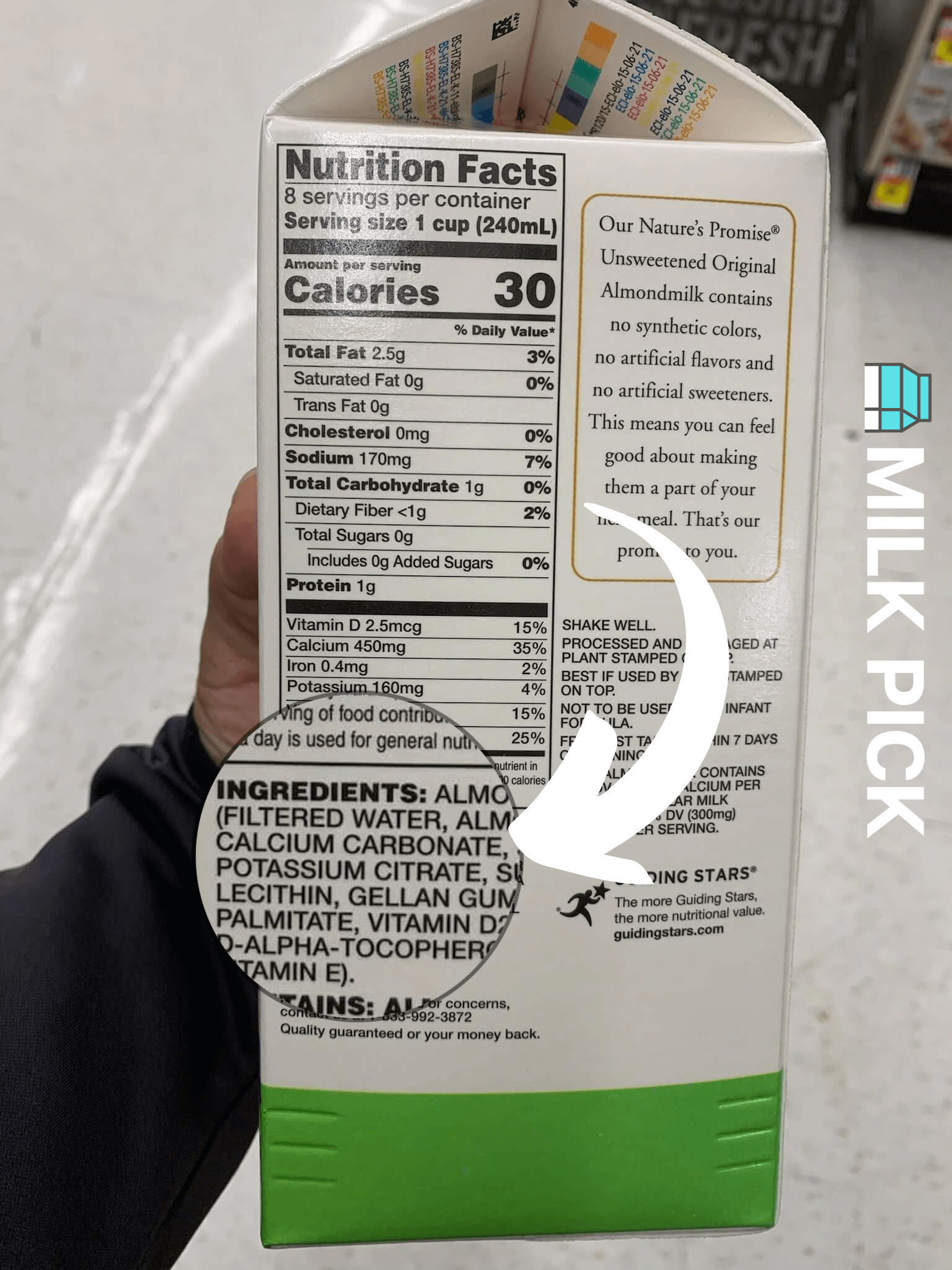
As a food additive, tricalcium phosphate is usually synthesized in a lab.
Both of these types of calcium are often added to food and beverages to provide supplemental calcium. As calcium is necessary for the health and strength of your bones, having enough calcium in your diet is important.
However, people who are already taking a calcium supplement may run into problems if they include too much calcium in their diets.
Abnormally high calcium levels can result in hypercalcemia, which can cause stomach upset, brain fog, overactive kidneys, and negatively impact heart function.
The verdict: As long as you’re not (a.) taking a calcium supplement and (b.) also drinking large quantities of calcium carbonate-fortified plant milk regularly, you’re probably going to be fine. Calcium carbonate and tricalcium phosphate are benign or beneficial additives for the vast majority of people. However, keep in mind that this ingredient is synthetic and not a natural source of calcium.
3. Gellan Gum
Gellan gum is an additive commonly used as a thickener.
If you've had plant-based milk that very closely resembles the consistency of whole cow milk, there's a high likelihood that it contains gellan gum and/or canola oil.
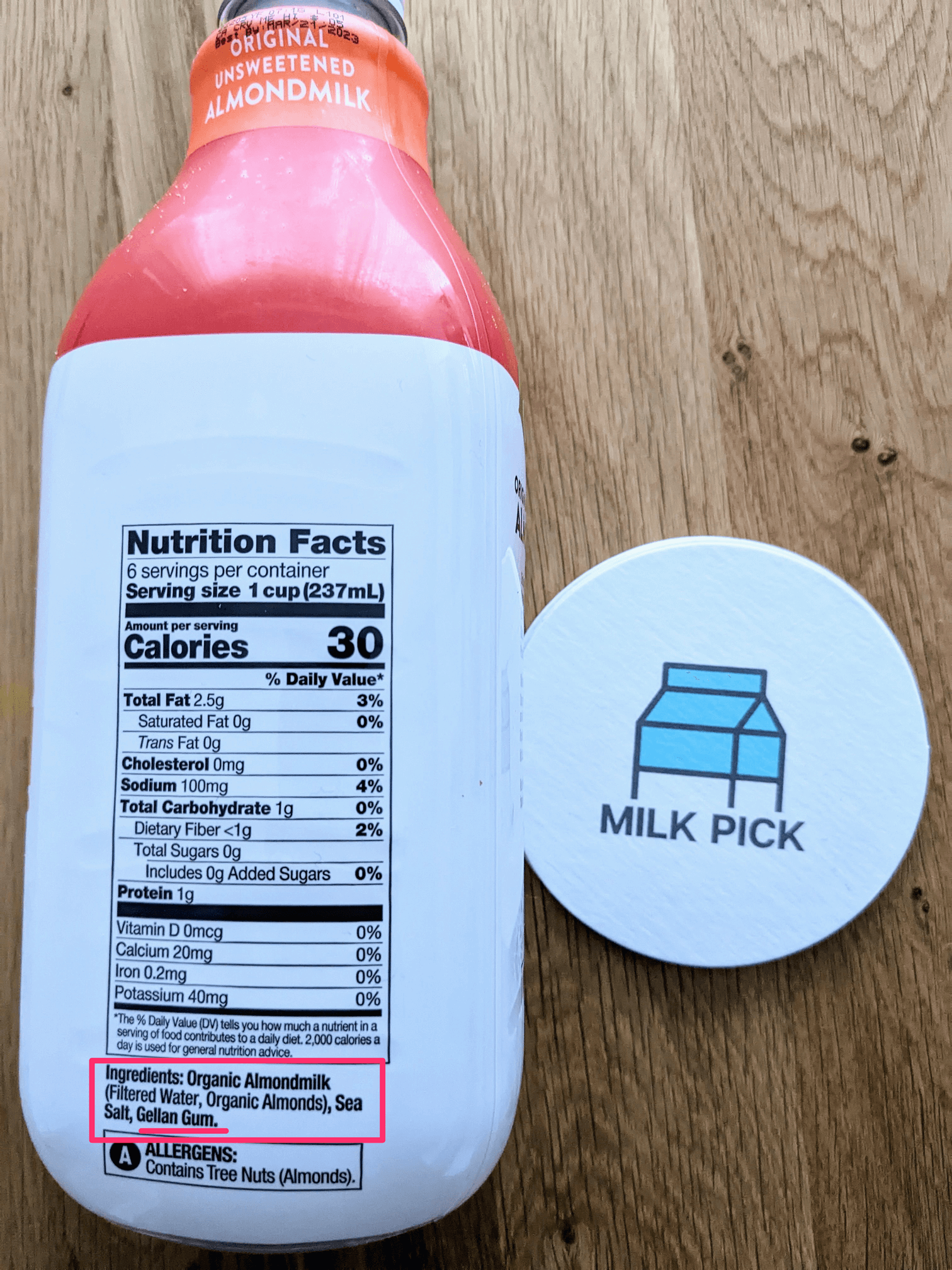
It also helps to prevent products from spoiling when there are shifts in temperature.
Gellan gum doesn’t raise any major red flags when it comes to health, although it may slow digestion, which can result in bloating and flatulence.
The verdict: Gellan gum consumed in small quantities in plant milk is safe and makes your plant milk more palatable. If you see this additive listed in the ingredients list on your plant milk carton, don’t sweat it. However, if you notice gut health issues and regularly drink plant-based milk with gellan gum, try removing it from your diet and track how you feel.
4. Low Erucic Acid (Otherwise Known as Canola Oil)
“Why is there canola oil lurking in my plant milk?!” you might ask, upon reading the ingredients of your favorite, creamiest brand.
The answer is that actually, the added canola oil might be why it’s so creamy!
Canola oil (a.k.a low erucic acid or rapeseed oil) is behind the smooth, thick quality of many popular plant-based milks.
It’s especially prevalent in oat milks used with coffee (a.k.a. Barista milk) because it allows the milk to froth, making it a more realistic substitute for cow milk.
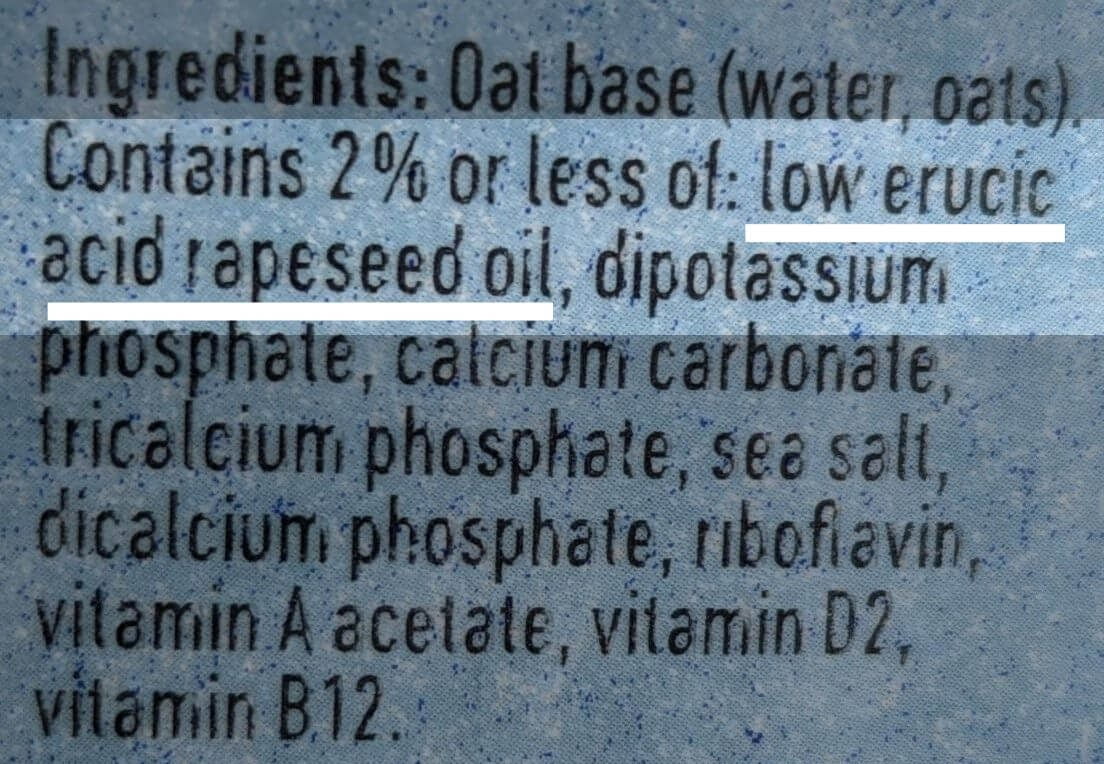
Whether this is necessarily an unhealthy addition to plant milk is a subject of debate.
According to Dr. Guy Crosby, canola oil is widely regarded as a ‘healthy oil’ since it is low in saturated fat.
However, it has also been linked to inflammation, memory issues, and weight gain in animal studies.
On top of that, canola oil is highly processed and a vast majority of it is genetically modified (i.e., it’s a GMO).
Unfortunately, brands aren’t required to disclose how much canola oil they use in their recipe.
However, the higher up it is on the ingredient list, the more prevalent it is.
The verdict: We recommend avoiding canola oil whenever possible, particularly if you want to avoid processed or genetically modified foods.
5. Carrageenan
Carriage-eenan? Kara-geenan? How do you even pronounce that?
Unfortunately, this one lives up to the old adage that says that if you can’t pronounce it, you probably shouldn’t consume it.
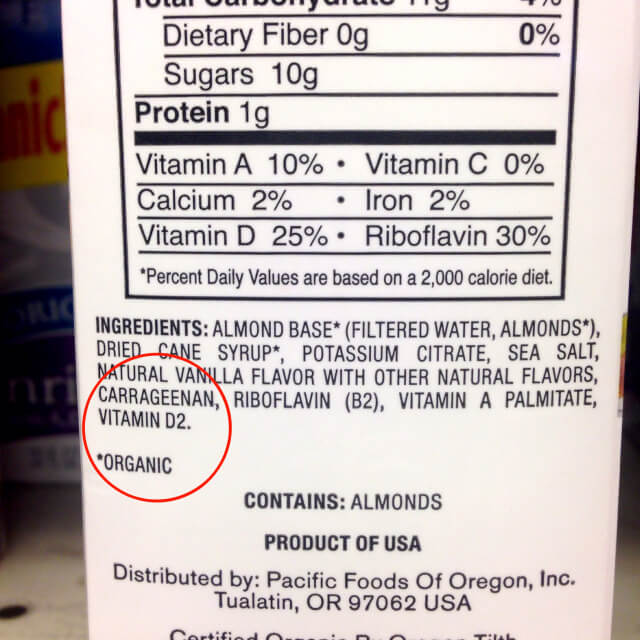
Carrageenan is made from seaweed. Sounds harmless, right?
Wrong!
This common additive acts as a thickener and binder and also helps to keep ingredients from separating, but it has been linked to an increased risk of colon cancer, gut inflammation, and impaired insulin response.
If you are someone who struggles with digestive health, avoid products containing carrageenan.
Additionally, the substance’s effect on insulin sensitivity is mostly relevant for people who have already developed type two diabetes, not the general population.
When it comes to colon cancer, preliminary animal research indicated that animals who consumed carrageenan were more likely to develop colon cancer than those who did not.
While more research is needed before drawing a conclusion, the information we have so far does not bode well for the safety of this additive.
The verdict: You should definitely avoid non-dairy milk containing carrageenan if you have digestive sensitivities or type two diabetes. Consider avoiding it otherwise, as well–better safe than sorry!
6. Sunflower and Soy Lecithins
These ingredients act as emulsifiers, which means that they bind oil or other fats with water so that you get to enjoy a smoother, creamier drinking experience.
Without an emulsifier, many plant milks are apt to taste watery or to separate.
This problem can be easily solved by simply shaking up the carton, but some consumers might mistake the separation of ingredients and the resulting watery first pour as spoilage.
Therefore, emulsifiers like sunflower and/or soy lecithin are added.

Lecithins are made of a gum extracted from dehydrated sunflowers or soybeans, which are then cold pressed and made into powder form.
Sunflower lecithin is more popular than soy lecithin, as soy is a common allergen.
That said, most of the allergens are removed during the manufacturing process, and the risk of having a reaction is so negligible that most allergists don’t even recommend that their patients avoid soy lecithin.
In addition to being an allergen, most soybeans are genetically modified. This is a major turnoff for many consumers.
Therefore, you’re more likely to find sunflower lecithin in a plant milk ingredients list these days. Sunflower lecithin consumed in high amounts could lead to unsavory gastrointestinal side effects.
The verdict: Lecithins are pretty harmless, as far as additives go. As long as you’re not consuming more than 5 grams of sunflower lecithin per day (highly unlikely), you may not notice any side effects. Even if you’re allergic to soy, you’re unlikely to have a reaction to soy lecithin. If you prefer non-GMO ingredients, however, avoid soy lecithin. However, we’d recommend sticking to brands without it, because it’s an unnecessary additive—just shake up your bottle!
7. Locust Bean Gum
This popular additive is yet another thickener, and it’s derived from the seeds of the carob tree.
Sounds alright so far, right?
Well…maybe not.

In vitro studies have shown that locust bean gum can block the absorption of key nutrients zinc and iron.
If you decide you want to avoid locust bean gum, look out for these other names it goes by:-Carob bean-Carob bean gum-E410-LBG
The verdict: Locust bean gum is an example of something that ‘sounds’ natural, which could be problematic for health. Consuming small amounts by adding plant milk to your coffee or enjoying it over the occasional bowl of granola is unlikely to be problematic, but it may temporarily block your ability to absorb some nutrients. Let this be a lesson showing that natural-sounding ingredients are not always harmless.
8. Dipotassium Phosphate
Dipotassium Phosphate is a compound found naturally in phosphate rocks, urine, and bones.
Most of the DPP used commercially is synthesized in a laboratory, and it has a variety of applications in antifreeze, fertilizer, and as a food additive. It is added to plant milk for its stabilizing, emulsifying, and texturizing capacities.

This ingredient is generally recognized as safe by the FDA, but folks with kidney conditions should avoid it because it could build up in their bodies, leading to dangerously low calcium levels.
Anyone with thyroid issues should also steer clear, as thyroid problems can make it difficult for the body to process phosphates.
It’s worth noting that a study conducted in 2012 warns against consuming synthetic phosphates.
“In view of the high prevalence of CKD and the potential harm caused by phosphate additives to food, the public should be informed that added phosphate is damaging to health. Furthermore, calls for labeling the content of added phosphate in food are appropriate.”
The Verdict: We recommend avoiding dipotassium phosphate when possible, as it’s likely from a synthetic source.
9. Potassium Citrate
Used to prevent curdling and other unsavory changes to taste, texture, and smell, as well as help plant milk maintain a neutral pH, Potassium Citrate is yet another synthetic additive.

However, it actually has some potential health benefits, as it adds potassium to the diet.
This form of potassium is often prescribed as a supplement for people with low potassium levels, and it can also lower blood pressure in patients with hypertension as well as be useful in dissolving kidney stones.
However, the small amount of potassium citrate in your plant milk is unlikely to add a meaningful amount of potassium to your diet unless you’re chugging it daily.
The verdict: Potassium citrate added to your plant milk will likely neither help nor harm you. But why drink milk with synthetic ingredients?
Avoid Unnecessary Additives
When it comes to discerning the health and safety profiles of unfamiliar ingredients, nuance is key.
Just because you haven’t heard of it and can’t pronounce it doesn’t mean it’s necessarily dangerous.
Similarly, just because the FDA has approved it doesn’t mean it’s necessarily good for you. Not all unnatural additives are harmful to health, but some may be.
While we don’t believe in demonizing brands purely for using additives, we also want to emphasize the importance of educating oneself on what’s going on behind the scenes of each ingredient and making choices rooted in research.
So, bookmark this link. Next time you’re at the supermarket scrutinizing the ingredients on the back of a new almond milk flavor you haven’t yet tried, pull up this article and make an informed decision.
